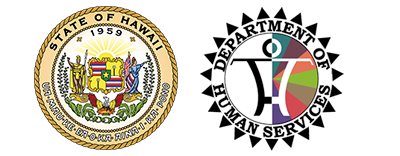HAWAIʻI EXPANDS ASSISTANCE TO HELP FAMILIES AND CHILD CARE PROVIDERS
Posted on Apr 15, 2020 in NEWSFOR IMMEDIATE RELEASE
April 15, 2020 (Revised May 1, 2020)
HAWAIʻI EXPANDS ASSISTANCE TO HELP FAMILIES AND CHILD CARE PROVIDERS
HONOLULU — The State of Hawaiʻi is expanding its efforts in early care and education to help both families and providers weather these uncertain times. Today, the Department of Human Services (DHS) announces the expansion of eligibility for its Child Care Connection Hawai‘i subsidies. This effort is one of many steps DHS and the Executive Office on Early Learning (EOEL) are taking to usher the early childhood sector through this pandemic.
Starting immediately, DHS is enacting a handful of adjustments to its existing subsidy that will translate to more money available to families accessing child care and the vital providers that take care of our keiki. “DHS is working alongside Hawai‘i’s families to get them through this pandemic. We have always known that child care is essential to our families’ livelihoods, and we’re here to make sure our commitment in this arena remains,” said DHS Director Pankaj Bhanot. Additionally, the department is working with sister agencies and contractors on efforts to support families and providers.
Important early care and education efforts include the following:
- Expand and waive select Child Care Connection Hawai‘i subsidy rules to make more monies available to families and providers.
- Compilation of emergency child care available to essential workers.
- Extend Preschool Open Doors open application period for subsidies.
Additional details about what these efforts and changes mean are attached.
Beyond helping families, the changes announced today are aimed at helping early childhood providers – preschools, family child care homes, and other providers – through the economic and logistical uncertainty during the pandemic. “While essential workers are on the front lines, early care and education providers are taking care of their kids, making sure they’re safe and nurtured. They are remarkable and vital to our community. We need to make sure these providers are still here to care for our keiki when the COVID-19 threat has passed,” said Lauren Moriguchi, EOEL Director.
DHS and EOEL are working alongside community organizations to support families needing emergency care as well as providers. The agencies and community partners are focusing on the longevity of this crucial sector. They will continue to provide information in the coming days and weeks.
If a family needs care or assistance, they can contact PATCH Hawaiʻi or Child Care Connection Hawaiʻi who are standing by to assist via phone and email. We ask families to help us stop the spread of COVID-19 by seeking assistance through remote means.
###
Media Contact:
Keʻōpū Reelitz
Communication Specialist
Executive Office on Early Learning
e: [email protected]
c: 808-892-8829
Amanda Stevens
Public Information Officer
Department of Human Services
e: [email protected]
o: 808-586-4892
Summary of Current Child Care Efforts
Child Care Connection Hawaiʻi Subsidies (CCCH)
- Temporary lift of the monthly gross income eligibility limits
What this really means: Families whose income may be too high may now apply for CCCH subsidies that will help significantly offset the cost of their child care expense and relieve them of that monthly bill.
- Temporary elimination of the activity requirement
What this really means: If a parent has lost her or his job, they may still be eligible to receive CCCH subsidy payments to hold spots or access care if they start essential work. This applies to current CCCH subsidy families as well.
- Case-by-case temporary elimination of family copays
What this really means: Families currently receiving CCCH subsidies and paying a copay may contact their Child Care Connection Hawaii office to see if they qualify to have their copay waived. The office may increase the CCCH subsidy payment temporarily to cover the copayment amount.
- Continuation of child care payments to hold a spot
What this really means: Some child care providers have temporarily stopped operations. Others continue to stay open for essential workers. Families have weighed how to pay providers to ensure a spot is there when they return to working out of the home. Families who are receiving or will receive CCCH assistance can use that subsidy to hold their spot and help ensure providers can resume regular operations in the coming months.
Child Care for Essential Workers
- Compilation of regulated providers offering child care for essential workers.
What this really means: DHS, through its contractor PATCH, has compiled and is maintaining a list of child care providers so essential workers can still get child care. The list is available online directly here or through the DHS or EOEL’s websites. It will be updated regularly. Families may also contact PATCH Hawaiʻi for assistance finding care.
Preschool Open Doors (POD)
- Extension of open application period to May 15
What this really means: Families have until May 15, to submit applications to PATCH Hawaii for the 2020-2021 program year. Although these POD child care subsidies start in July 2020 or later, they may help families getting back on their feet and provide continued stability for their children. These are available for children going to a group child care center or group child care home (e.g., preschool) in the year before they enter kindergarten.
